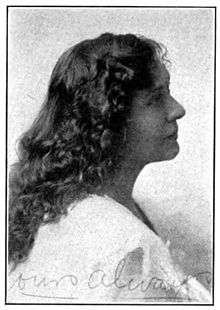Cecil Spooner
Cecil Spooner (January 29, 1875 – May 13, 1953) was an American stage and film actress, screenwriter, and film director.
Cecil Spooner | |
|---|---|
 | |
| Born | January 29, 1875 New York City, New York |
| Died | May 13, 1953 Sherman Oaks, California |
| Occupation | Stage and film actress, screenwriter, film director |
| Years active | 1903–1950 |
Biography
Cecil Spooner was born on January 29, 1875, in New York City. Her mother, Mary Gibbs Spooner, ran a theater in Brooklyn.[1]
Spooner made her New York theater debut in 1903 in My Lady Peggy Goes to Town,[2] adapted from the 1901 novel of the same name by Frances Aymar Mathews.[3] She continued to appear on Broadway throughout the decade.[4]
Spooner married Charles E. Blaney, who had written several of the Broadway plays in which she appeared, in 1909.[1] That same year, Spooner made her motion picture debut in the Edison Studios adaptation of Mark Twain's The Prince and the Pauper. Spooner played the roles of the prince, Edward, and the pauper, Tom Canty. She was praised by a reviewer for Moving Picture World for her ability to convey the distinctions between the two characters.[5]
In 1914, Spooner wrote, directed, and starred in the silent film Nell of the Circus.[1]
On December 9, 1914, Spooner was arrested at the Bronx theater that she managed for "indecency." The police and the local community had taken offense to the play Spooner had opened the night before, The House of Bondage, and its treatment of "white slavery," a euphemistic term for sex trafficking. Spooner was released into the custody of her lawyer; she revised the play twice to remove the "objectionable" content, but the show ran for only eight performances and was reviewed negatively by theater critics.[6]
Spooner appeared in several films in the early 1920s, and she returned to Broadway in the late 1920s and early 30s.[4] Her last known acting role was in a 1950 episode of the TV show The Lone Ranger.[7]
Cecil Spooner died on May 13, 1953, in Sherman Oaks, California.[1]
Selected filmography
- One Law for the Woman (1924)
- The Love Bandit (1924)
- Peaceful Neighbors (1922)
- He's Bugs on Bugs (1922)
- Money or My Life (1922)
- Nell of the Circus (1914) (also writer and director)
- The Dancer and the King (1914)
- Hansel and Gretel (1909)
- The Prince and the Pauper (1909)
References
- "Spooner, Cecil (1875–1953) | Encyclopedia.com". www.encyclopedia.com. Retrieved 2019-08-02.
- "My Lady Peggy Goes to Town – Broadway Play – Original | IBDB". www.ibdb.com. Retrieved 2019-08-02.
- Mathews, Frances Aymar (1901). My Lady Peggy Goes to Town. Grosset & Dunlap.
- "Cecil Spooner – Broadway Cast & Staff | IBDB". www.ibdb.com. Retrieved 2019-08-02.
- Horak, Laura (2016-02-26). Girls Will Be Boys: Cross-Dressed Women, Lesbians, and American Cinema, 1908-1934. Rutgers University Press. ISBN 9780813574844.
- Houchin, John H. (2003-06-26). Censorship of the American Theatre in the Twentieth Century. Cambridge University Press. pp. 68–69. ISBN 9780521818193.
- "Cecil Spooner". IMDb. Retrieved 2019-08-02.